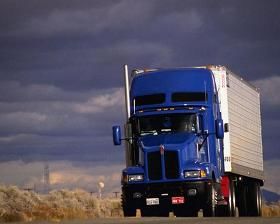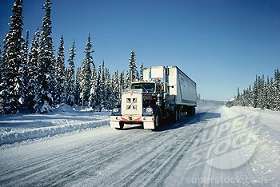How Hard Is It To Find Local Truck Driving Jobs Vs Long Haul?
Topic 9998 | Page 2

Driving locally can be brutal. I know Old School is just trying to ensure that drivers don't get into it over their heads. I enjoy driving locally....it's all I've ever done, but I honestly do not know how I survived my first year without a major accident.
Noob question, but how hard is it to find local truck driving jobs? I'm thinking getting my CDL but the lifestyle of an OTR driver living on the road doesn't really appeal to me. Any feedback would be greatly appreciated, thanks!
I lucked out getting my local gig. I was hired for OTR, but while I was in training one of the local positions became available and was offered to me. I work for a smaller company with about 200 trucks. So the local jobs are out there, depending on your location. Some of the places I get to go are quite challenging and I'm grateful that I have damaged any equipment or property. I do a ton of drop and hooks in a day, so I do get my exercise! But I am home every night and I'm grateful for that.
CDL:
Commercial Driver's License (CDL)
A CDL is required to drive any of the following vehicles:
- Any combination of vehicles with a gross combined weight rating (GCWR) of 26,001 or more pounds, providing the gross vehicle weight rating (GVWR) of the vehicle being towed is in excess of 10,000 pounds.
- Any single vehicle with a GVWR of 26,001 or more pounds, or any such vehicle towing another not in excess of 10,000 pounds.
- Any vehicle, regardless of size, designed to transport 16 or more persons, including the driver.
- Any vehicle required by federal regulations to be placarded while transporting hazardous materials.
OTR:
Over The Road
OTR driving normally means you'll be hauling freight to various customers throughout your company's hauling region. It often entails being gone from home for two to three weeks at a time.
Drop And Hook:
Drop and hook means the driver will drop one trailer and hook to another one.
In order to speed up the pickup and delivery process a driver may be instructed to drop their empty trailer and hook to one that is already loaded, or drop their loaded trailer and hook to one that is already empty. That way the driver will not have to wait for a trailer to be loaded or unloaded.

He and Six String both live in an area where the demand for local drivers is so intense that I'm not sure they realize how fortunate they are. Now to be fair, they both qualified their responses with an emphasis on location.
A curious statement Old School. I'm not sure why you would think that I might not be aware of how fortunate I am. Everyday I go to work I'm thankful for my linehaul job at OD, and certainly realize how fortunate I am. Just because I like to represent the world of LTL on this forum, and make sure folks are aware that there are other ways to start a career in this industry besides going OTR , doesn't mean that I'm not aware of how fortunate I am.
I understand and agree with the reasons why some would preach to start a career in OTR before going local, but I am also going to make sure that others know there are other opportunities out there, if they live in the right area. How that might come across that I'm not aware of how good I have it, is beyond me. I always try to temper my enthusiasm to share my experiences with sound judgment, realizing that not all areas support the same amount of opportunities. My enthusiasm stems from my gratitude in that I did not have to go OTR, and I'd like other families to experience that blessing, if that's the path that best suits them, and if they live in an area that would present that opportunity. But don't mistake my enthusiasm for ignorance. I'm here to help, just like you. The last thing I want to do is come across as ungrateful and ignorant, or possibly mislead anybody reading these posts. I'm here to contribute.
LTL:
Less Than Truckload
Refers to carriers that make a lot of smaller pickups and deliveries for multiple customers as opposed to hauling one big load of freight for one customer. This type of hauling is normally done by companies with terminals scattered throughout the country where freight is sorted before being moved on to its destination.
LTL carriers include:
- FedEx Freight
- Con-way
- YRC Freight
- UPS
- Old Dominion
- Estes
- Yellow-Roadway
- ABF Freight
- R+L Carrier
OTR:
Over The Road
OTR driving normally means you'll be hauling freight to various customers throughout your company's hauling region. It often entails being gone from home for two to three weeks at a time.
Linehaul:
Linehaul drivers will normally run loads from terminal to terminal for LTL (Less than Truckload) companies.
LTL (Less Than Truckload) carriers will have Linehaul drivers and P&D drivers. The P&D drivers will deliver loads locally from the terminal and pick up loads returning them to the terminal. Linehaul drivers will then run truckloads from terminal to terminal.
I am another one that went local and without going to school or riding with a trainer. Do I recommend this method.......... Heck no because very few can pull it off. The thing that was on my side was that I was 45 and not 21 when I started and have been pulling trailers all my life so I knew the basics already. The company I work for also does a variety of things such as belly dumps, flatbed and stepdeck and lowboys. It is not uncommon that I will be hooked to 5 different trailers in the course of a week or 3 different trailers in one day. I am home most nights with the occasional overnight gig.
By far, the easiest work to find locally is dirt work. Belly Dumps, side dumps, end dumps, water trucks, equipment moving etc. If you are willing to get dirty you will easily find a job. If you must keep your fingernails clean then find a desk job... LOL
Stepdeck:
A stepdeck , also referred to as "dropdeck", is a type of flatbed trailer that has one built in step to the deck to provide the capabilities of loading higher dimensional freight on the lower deck.

Thanks for the replies guys, it's helping a lot. I'll be moving to Aldie, VA here in the next month or so (currently in Herndon VA in a hotel); wouldn't mind doing dirty work as a dump/water truck driver for a while if push comes to shove. Committing to OTR for 1 year may be something I'll have to sit down and think about also, but there're a lot of goals that I have outside of the workplace that I wouldn't be able to work on during that time, which is the main reason why I would prefer not to (finishing up my degree and working on music are the main ones). I understand the risks of going straight into local driving but it seems like the best option. Anyone know how things are over here in Virginialand?
OTR:
Over The Road
OTR driving normally means you'll be hauling freight to various customers throughout your company's hauling region. It often entails being gone from home for two to three weeks at a time.

...but there're a lot of goals that I have outside of the workplace that I wouldn't be able to work on during that time, which is the main reason why I would prefer not to (finishing up my degree and working on music are the main ones).
James. One very important thing to realize about going local is that you will be working long hours, typically. This means that you might not have much time to do anything but work during the work week, and recuperate / relax / do chores during your weekends. Not all local jobs are equal. Some pay a lot more, some require more hours. LTL is one avenue of local trucking, although linehaul can typically have you traveling 300-600 miles a day, which isn't really considered 'local.'
I'm a linehaul driver and will typically work 10-14 hours a day. P&D guys (pickup and delivery) can work an average of 12 hours. I can't speak for construction driving, container hauling, or food service, but you can check out my thread on LTL (which includes descriptions of linehaul and P&D). LTL offers some of the highest paying trucking jobs in the industry. But you've got to be in the right area.
Going back to the daily life of somebody who gets home daily. I have a young family. Basically, I work my five days, and on my weekends I try to manage my time by spending it with my family, doing chores, etc... I don't have a lot of free time, even though I'm home every day. But ... I get paid well, and have the reward of supporting my family. Lots of singles can bemoan the amount of hours they're working while doing local driving, but being home daily in the trucking industry requires another form of sacrifice.
LTL:
Less Than Truckload
Refers to carriers that make a lot of smaller pickups and deliveries for multiple customers as opposed to hauling one big load of freight for one customer. This type of hauling is normally done by companies with terminals scattered throughout the country where freight is sorted before being moved on to its destination.
LTL carriers include:
- FedEx Freight
- Con-way
- YRC Freight
- UPS
- Old Dominion
- Estes
- Yellow-Roadway
- ABF Freight
- R+L Carrier
P&D:
Pickup & Delivery
Local drivers that stay around their area, usually within 100 mile radius of a terminal, picking up and delivering loads.
LTL (Less Than Truckload) carriers for instance will have Linehaul drivers and P&D drivers. The P&D drivers will deliver loads locally from the terminal and pick up loads returning to the terminal. Linehaul drivers will then run truckloads from terminal to terminal.
Linehaul:
Linehaul drivers will normally run loads from terminal to terminal for LTL (Less than Truckload) companies.
LTL (Less Than Truckload) carriers will have Linehaul drivers and P&D drivers. The P&D drivers will deliver loads locally from the terminal and pick up loads returning them to the terminal. Linehaul drivers will then run truckloads from terminal to terminal.
Thanks for the replies guys, it's helping a lot. I'll be moving to Aldie, VA here in the next month or so (currently in Herndon VA in a hotel); wouldn't mind doing dirty work as a dump/water truck driver for a while if push comes to shove. Committing to OTR for 1 year may be something I'll have to sit down and think about also, but there're a lot of goals that I have outside of the workplace that I wouldn't be able to work on during that time, which is the main reason why I would prefer not to (finishing up my degree and working on music are the main ones). I understand the risks of going straight into local driving but it seems like the best option. Anyone know how things are over here in Virginialand?
I actually just got a local job in Virginia around fredricksburg hauling dump trailers. It's just like a dump truck just bigger. There are a lot of local opportunities in my area of Virginia being so close to baltimore or DC, what area are you in and I'll give you a better idea
OTR:
Over The Road
OTR driving normally means you'll be hauling freight to various customers throughout your company's hauling region. It often entails being gone from home for two to three weeks at a time.

Thanks for the replies guys, it's helping a lot. I'll be moving to Aldie, VA here in the next month or so (currently in Herndon VA in a hotel); wouldn't mind doing dirty work as a dump/water truck driver for a while if push comes to shove. Committing to OTR for 1 year may be something I'll have to sit down and think about also, but there're a lot of goals that I have outside of the workplace that I wouldn't be able to work on during that time, which is the main reason why I would prefer not to (finishing up my degree and working on music are the main ones). I understand the risks of going straight into local driving but it seems like the best option. Anyone know how things are over here in Virginialand?
I actually just got a local job in Virginia around fredricksburg hauling dump trailers. It's just like a dump truck just bigger. There are a lot of local opportunities in my area of Virginia being so close to baltimore or DC, what area are you in and I'll give you a better idea
I have often been curious what something like dump truck or propane delivery pays. If anyone has ideas that is.
OTR:
Over The Road
OTR driving normally means you'll be hauling freight to various customers throughout your company's hauling region. It often entails being gone from home for two to three weeks at a time.

... the problem with going local first lies in the fact that if you do end up having a minor accident it is a lot more likely to end your career than it would had you started off with an over the road company who is probably going to be a little more lenient on your first one or maybe even two accidents...
Seems to me that Heavy C and Mountain Girl's experiences clearly disprove that notion. In MG's case, her company continues to work with her... Even after multiple accidents/incidents.
Over The Road:
Over The Road
OTR driving normally means you'll be hauling freight to various customers throughout your company's hauling region. It often entails being gone from home for two to three weeks at a time.
New Reply:
New! Check out our help videos for a better understanding of our forum features

















Preview:
This topic has the following tags:
Advice For New Truck Drivers Choosing A Trucking Company Local CDL Drivers LTL Driving Truck Driving Lifestyle







 TT On Facebook
TT On Facebook
Oh sure Old School you had to go ahead and bring that accident up lol. I was thought we were friends.
So like so many times before old school is right here. I, like 6String like to help drivers see that it is very possible to go local right away. Yes there are lots of factors come into play and yes I consider myself very fortunate to get the job I got. In the same token though there are lots of ladies and gents that are like me that just aren't ready to risk our families by being gone weeks at at a time.
My last answer was a little short so maybe I showed the wrong tone in the point I was trying to convey.